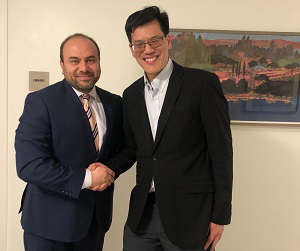A New Way to Think About Parkinson's Care
UCLA Workshop Explores the Challenges, Benefits of Learning Healthcare Systems
March 6, 2020: FOR IMMEDIATE RELEASE

Patients with Parkinson’s disease often endure a long journey before arriving at the correct diagnosis. The symptoms can be subtle and vary widely among patients. Treatments also vary, depending on the individual patient’s symptoms, goals, and lifestyle. Sometimes patients struggle to make their voice heard when developing a treatment plan, or to see how the data collected from them will improve their personal outcome.
There could be a better way. UCLA’s Department of Neurology, in concert with Prof. Allan Wu, assembled physicians, data scientists, patient advocates, funding agencies, and public policy experts last month to share ideas and develop action plans toward implementing a model of healthcare that aligns the interests of patients, doctors, and researchers. The model, called a “learning healthcare system,” enables real-time feedback and effective use of medical data to constantly update treatment plans.
“This is fundamentally different than the way we practice medicine and the way we organize research,” said Dr. Jeffrey Buchhalter, adjunct professor of pediatrics at the University of Calgary. “These are patients and caregivers sitting down at the table with us to decide what are the things we are going to do, how are we going to measure it, and does it have value? If it doesn’t, we don’t do it.”
Buchhalter helped establish the Epilepsy Learning Healthcare System, and he spoke enthusiastically about how learning healthcare systems have saved lives whenever they’ve been implemented. He also shared from his experience the necessary institutional supports that will need to be in place to help the system succeed.
California State Assemblyman Adrin Nazarian also attended the meeting to learn more about how legislators can support this kind of innovation in the way neurodegenerative diseases are treated. “We’re at a point now where we can continue building in this area,” he said. He encouraged participants to continue providing data and analysis to the legislature. “Make sure your opinions are heard,” he said.
In 2017, Assemblyman Nazarian secured $3.7 million in funding for a statewide Parkinson’s Disease Registry (CPDR) to gather data on the disease. Researchers hoped they could use the information to gain a deeper understanding of how the disease is caused and the most effective treatment plans. But Parkinson’s is complex and often challenging to diagnose, and the data amassed by the registry, though copious, has not necessarily been high quality enough to support rigorous research. When the CPDR’s funding expires at the end of 2020, some physicians question whether continuing the registry in its current form is the best use of resources.
“The impression is that the registry is a one-way street, that doesn’t help patients and doesn’t help individual physicians,” said UCLA neurologist Dr. Allan Wu, who organized the workshop.
Health information technology is the backbone of a learning healthcare system. A robust HIT system feeds into a “virtuous cycle,” Buchhalter said, a feedback loop in which discovery comes as a natural outgrowth of patient care.
A disease registry is a key component of a learning healthcare system, but it’s not the only component. While the registry benefits patients indirectly over the long term, a learning healthcare system can benefit patients and drive process improvements in healthcare delivery in a more immediate term.
The benefits are meaningless, however, if the system is too cumbersome to fit smoothly into the physician’s workflow. During the course of the workshop, speakers addressed the challenges of involving the primary care physician, who is often the first to identify potential Parkinson’s disease symptoms, and must address a variety of health issues during the course of a very short visit.
During a vigorous group discussion, participants weighed their top priorities for how to move forward with a learning healthcare system for Parkinson’s disease and other neurodegenerative disorders. One key goal was to establish a governance body, representing not only neurologists but other physicians, data scientists, and patients, to set standards for quality data collection. This advisory body would define what’s important in terms of diagnosis, treatment, and outcomes information. Only by combining the expertise of data scientists and physicians can a system be developed in which doctors can collect high quality data without undue disruption of their primary purpose: connecting with and caring for the patient.
“Data collection and analytics must be done with a focus on quality of care and added-value to patients and clinicians,” said Wu. “Learning healthcare systems are an established methodology to accomplish this.”
Media Contact
Marrecca Fiore
310-562-4161
[email protected]